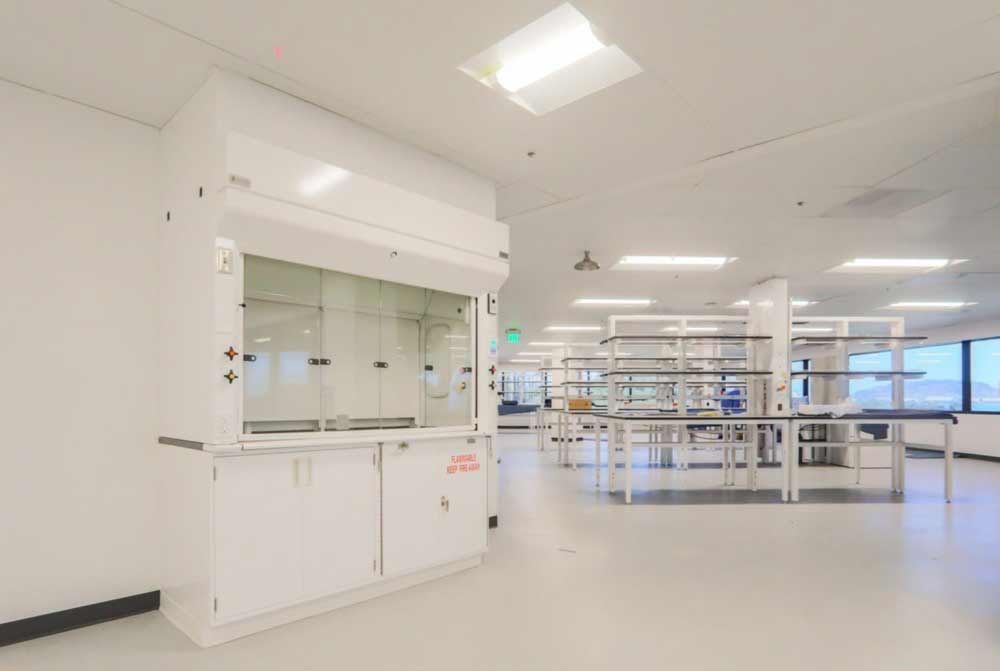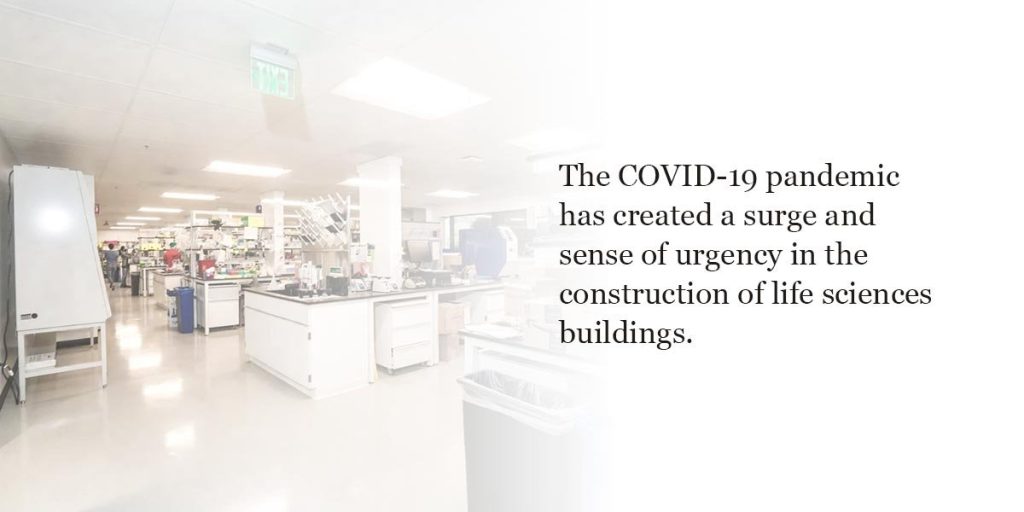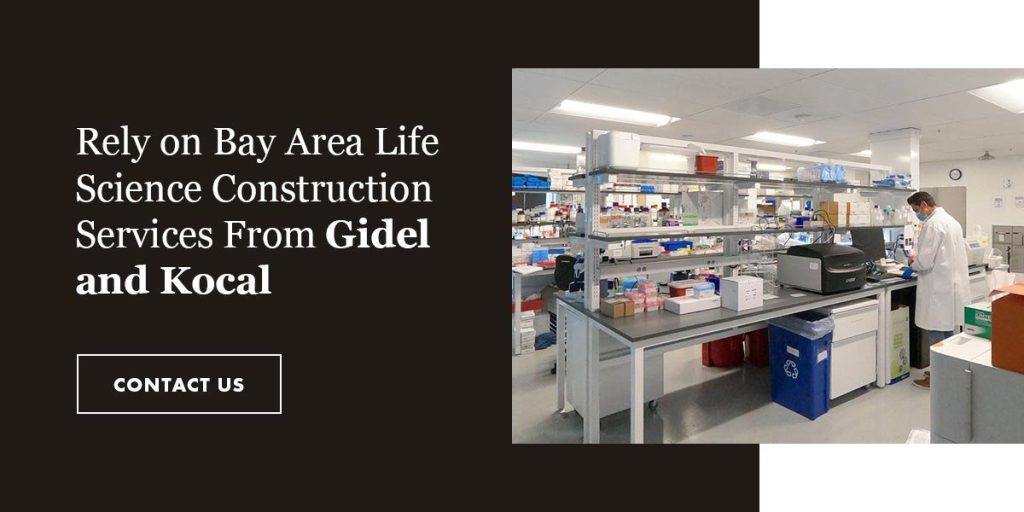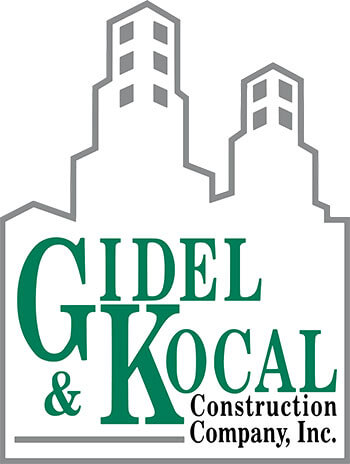
Understanding a project’s current and end needs is crucial in any construction application but even more necessary when working with life sciences facilities with strict regulations. Life sciences construction is booming in the Bay Area and other primary medical hubs throughout the country, so how does the construction industry adapt and how does it affect your needs?
What Is the Life Sciences Industry?
The life sciences industry consists of companies that produce products to improve our health and general well-being. These efforts can range from developing vaccines to producing medical devices or commercializing treatments and equipment to prolong human lives. Life sciences maintains high performance standards and technical requirements. Companies within the life sciences industry include:
- Pharmaceuticals: Research, develop and distribute generic or innovator medicines
- Biotechnology: Research, create and manufacture commercial medical applications while also working with vaccines, alternatives to fuels and growing food
- Medical devices: Develop surgical instruments like machines, software or implants
- Lab space: Test and develop various health, genetic, anatomy and ecological applications
- Food processing: Study the composition of foods through chemistry, microbiology, physics, engineering and biology
In a more simple definition, the life sciences industry is the study of living organisms like plants, animals and humans and their life processes.
Why Is Life Science Construction Different?
When it comes to new life science construction or conversions, these medical and science facilities require special builds. Compared to a more general construction project, life sciences need to meet Occupational Safety and Health Administration (OSHA) standards, maintain certain lab requirements, comply with governmental and environmental regulations and be incredibly secure, sterile and precise.
Life science construction includes aspects, such as:
- Specialized infrastructure
- Chemical storage
- Clean rooms
- Ventilation systems
- Backup generator power
- Climate control
- Additional HVAC
- Extended ceiling heights
- Fireproof systems
- Energy-efficient plans
- Housing of biological organisms
Within the life sciences construction sector, builders have to anticipate all these obstacles then strategically plan for them. It’s all about creating spaces that adhere to strict infrastructures, systems and a myriad of stipulations.
While construction companies can build new facilities, retrofitting buildings can save time and money. Conversions have also become more common since the COVID-19 pandemic, as many people have left the office and begun remote work.
Converting office spaces into life sciences buildings comes with many considerations, and each project must be individually evaluated. In some cases, a space may already be up to par, but in others, an updated design may be necessary.
Three readiness stages for a converting space include:
- Research and Development Friendly: Need to design and construct required infrastructures and labs
- Research and Development Ready: Moderate readiness where tenant can move in but space must be designed to correct specifications
- Plug and Play: Maximum readiness where space is fully built, furnished and ready for occupancy
Construction teams that specialize in life sciences will consider design and remodel factors when converting spaces, which ultimately saves time and money while sustainably repurposing buildings. Building facilities from the ground up requires the same efforts but at a larger scale.

Why Are Life Sciences Facilities on the Rise?
The COVID-19 pandemic has created a surge and sense of urgency in the construction of life sciences buildings. But before 2020, the industry already began to rise because of additional funding that was pushed through for research and testing purposes.
There was, and still is, also more potential for medicine, genomics, personalized medicine and other fields as technologies and research continue to advance and converge.
COVID-19 has pressed the industry to develop more lab space for vaccine development as well as testing and research. The pandemic has also created heightened awareness across the nation for more facilities that support research, diagnostics and manufacturing abilities.
California, for example, received about $5 billion in life sciences funding from the National Institutes of Health (NIH) in 2021. This funding is a continuation of what was being built in previous years as engineering and technology continues to merge with the medical field — the pandemic just accelerated it even more. From 2019 to 2022, life sciences establishments in California increased by 3%.
In contrast to a surge in medical facilities, physical office spaces are declining as people are working remotely. This shift is pushing construction companies to support life sciences buildings over other business offices. The medical field is one industry that doesn’t entirely support remote work, so while there is vacancy in office buildings, there is little to no vacancy in the science sector. These unused spaces can then be converted into life sciences facilities on a massive scale.
The Bay Area is booming with life sciences buildings, as it’s one of the biggest three life-sciences dominant markets in the U.S. along with Boston and San Diego. In 2020, the San Francisco area dominated the market with the prominence of influential research institutions, universities and research hospitals. During that same year, San Fran saw billions of dollars worth of sales volume in the life sciences sector. Today, lab space, manufacturing buildings and skilled technical workers continue to increase in the Bay Area.
For construction companies across the nation, it’s a time to embrace changing and current demands of the industry. With this, there is now a speed-to-market crunch to have medical operations up and running in quicker times than ever. This demand is why it’s critical to partner with a construction company that specializes in life sciences.
How to Choose a Life Science Builder
Partnering with a life science builder comes down to making sure they specialize and have experience in this sector. Medical-related buildings must meet stringent requirements, and the builder you work with must understand the design specifications for various medical spaces while delivering projects on time. Some characteristics of a life science builder to consider include:
- Reacts to needs of clients
- Offers real-time data reporting
- Schedules efficiently
- Minimizes rework
- Has correct certifications
- Has design and process protocols
- Offers flexible construction practices
- Embraces new ideas
- Employs skilled labors
- Provides strong replanning
- Has exceptional foresight
Choose a specialized builder who will collaborate while maintaining industry requirements at the same time. Do they also look at sustainable blueprints that support the facility’s workers and not just the patients? Do they consider how the project schedule and budget relies on overall performance? Do they think about how what they build today must also support future needs of the life sciences industry?
Gidel and Kocal has experience in life sciences, constructing facilities such as:
- Aseptic facilities
- Cleanrooms
- Current Good Manufacturing Practices
- High containment labs
- Manufacturing facilities
- Office and support space
- Pilot plants
- Vivariums
- Wet and dry laboratories
Other qualities you should look for when exploring different builder options range from viewing completed projects and reading reviews to making sure they have the exact services you’re looking for like pre-construction or design protocols.
Not every building is a life science conversion, so make sure the builder inspects your prospective space and determines a specific game plan.

Rely on Bay Area Life Science Construction Services from Gidel & Kocal Construction Co., Inc.
Gidel & Kocal Construction Co., Inc is a women-owned, full-service construction firm that specializes in constructing life sciences facilities. With more than 40 years of expertise, we are ready to partner with you in building advanced medical structures.
Our team can convert offices and other facilities into life science buildings, partnering with you along the way to create solutions. We also provide comprehensive preconstruction services like budgeting, analyzing location, remodeling and conversion.
Contact a team member to get started on your Bay Area life science building, whether you want to renovate an existing facility or build something new! See our life sciences project here.
